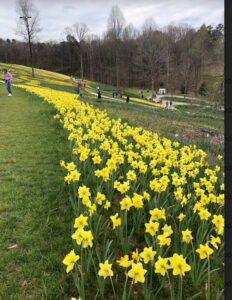 Follow Me: Biblical Practices for Faithful Living
Follow Me: Biblical Practices for Faithful Living
“Honor God’s Diversity – Affirming Those Who Are Marginalized”
Genesis 1-2 (selected verses)
May 22, 2022
Genesis 1-2 (selected verses)
In the beginning when God created the heavens and the earth, the earth was a formless void and darkness covered the face of the deep, while a wind from God swept over the face of the waters. Then God said, ‘Let there be light’; and there was light. And God saw that the light was good; and God separated the light from the darkness. God called the light Day, and the darkness he called Night. And there was evening and there was morning, the first day.
And God said, ‘Let there be a dome in the midst of the waters, and let it separate the waters from the waters.’ So God made the dome and separated the waters that were under the dome from the waters that were above the dome. And it was so. God called the dome Sky. And there was evening and there was morning, the second day.
And God said, ‘Let the waters under the sky be gathered together into one place, and let the dry land appear.’ And it was so. God called the dry land Earth, and the waters that were gathered together he called Seas. And God saw that it was good. Then God said, ‘Let the earth put forth vegetation: plants yielding seed, and fruit trees of every kind on earth that bear fruit with the seed in it.’ And it was so. The earth brought forth vegetation: plants yielding seed of every kind, and trees of every kind bearing fruit with the seed in it. And God saw that it was good. And there was evening and there was morning, the third day.
And God said, ‘Let there be lights in the dome of the sky to separate the day from the night; and let them be for signs and for seasons and for days and years, and let them be lights in the dome of the sky to give light upon the earth.’ And it was so. God made the two great lights—the greater light to rule the day and the lesser light to rule the night—and the stars. God set them in the dome of the sky to give light upon the earth, to rule over the day and over the night, and to separate the light from the darkness. And God saw that it was good. And there was evening and there was morning, the fourth day.
And God said, ‘Let the waters bring forth swarms of living creatures, and let birds fly above the earth across the dome of the sky.’ So God created the great sea monsters and every living creature that moves, of every kind, with which the waters swarm, and every winged bird of every kind. And God saw that it was good. God blessed them, saying, ‘Be fruitful and multiply and fill the waters in the seas, and let birds multiply on the earth.’ And there was evening and there was morning, the fifth day.
And God said, ‘Let the earth bring forth living creatures of every kind: cattle and creeping things and wild animals of the earth of every kind.’ And it was so. God made the wild animals of the earth of every kind, and the cattle of every kind, and everything that creeps upon the ground of every kind. And God saw that it was good.
Then God said, ‘Let us make humankind in our image, according to our likeness; and let them have dominion over the fish of the sea, and over the birds of the air, and over the cattle, and over all the wild animals of the earth, and over every creeping thing that creeps upon the earth.’
So God created humankind in his image,
in the image of God he created them;
male and female he created them.
God blessed them, and God said to them, ‘Be fruitful and multiply, and fill the earth and subdue it; and have dominion over the fish of the sea and over the birds of the air and over every living thing that moves upon the earth.’ God said, ‘See, I have given you every plant yielding seed that is upon the face of all the earth, and every tree with seed in its fruit; you shall have them for food. And to every beast of the earth, and to every bird of the air, and to everything that creeps on the earth, everything that has the breath of life, I have given every green plant for food.’ And it was so. God saw everything that he had made, and indeed, it was very good. And there was evening and there was morning, the sixth day.
Thus the heavens and the earth were finished, and all their multitude. And on the seventh day God finished the work that he had done, and he rested on the seventh day from all the work that he had done. So God blessed the seventh day and hallowed it, because on it God rested from all the work that he had done in creation.
Last weekend, Melanie and I and one of our sons visited Gibbs Gardens in North Georgia. If you not been to Gibbs Gardens, it is certainly worth your trip. The 300 plus acre gardens are located directly north of Atlanta, just over an hour from Decatur. We have been several times to Gibbs Garden over the years. Recently, in March, we witnessed 20 million daffodils, no joke, covering several hillsides and coloring the wooded glens. Truly a staggering and beautiful display of color!

Last weekend, we enjoyed beautiful rhododendrons in blossom, and hundreds of foxgloves.

Then, just before we left, we walked through a new area called Inspiration Gardens. Inspiration Gardens is a relatively new installation of dwarf conifers. I have visited conifer gardens in the Carolinas and the Pacific Northwest and in China, and this installation in North Georgia is world-class, one of the finest anywhere. The variety and placement of the evergreens is extraordinary. Blue spruce, cedar, fir, juniper, cypress, yew, pine, and so many others.

The experience reminded me of a Barbara Brown Taylor sermon I read some years ago. Barbara had gone hiking in the North Carolina mountains and was amazed, dazzled even, by the dozens of varietals of mushrooms on that one mountain hike. Barbara Brown Taylor, in only the manner that this world-renowned preacher can do, described the mushrooms by their color and shape and size, and her experience of them, all culminating in her affirmation that the diversity of God’s creation is wondrous, evocating awe and inspiration, if we but take a moment to observe.
To honor the diversity of God’s creation, we first have to notice, and recognize, and then celebrate!
On another different, how many of you have visited a dog park recently?

Dog parks are relatively recent additions to urban life. There are a number of popular dog parks in the city of Decatur, and now we are able to walk our dogs – off leash! – through the back part of Legacy Park on South Columbia Drive, which is wonderful!
The other day at Legacy Park, I was jogging along with Zoe at my feet and Chevy, my yellow lab, slowly making his way along, about 30 yards behind me, and we came upon a huge greyhound and its owner – a beautiful specimen, probably adopted from one of the greyhound race tracks.
Then, just around another corner were two little yipping Papillons, who tried their best to let us know that they were the boss of that particular part of the park. Next, our dogs enjoyed a fun romp around with a good old Heinz 57 variety, who had the best personality of all of them.
I have been wondering as I prepared the sermon this week, why is it that human beings so enjoy different varieties of flowers and of dogs and of mushrooms even, but seem to have such a hard time accepting human beings who are different than ourselves?
Look around you. Go ahead, look around the sanctuary. Humans, like animals and plant life, come in all colors, shapes, and sizes. Each one of us is a unique creation. No two of us are exactly the same. Some are very tall; others are very short. Some have skin or hair that is very light in color; others have skin or hair that is very dark in color. Some are big-boned and strong; others are thin and light.
Some are gifted with incredible creativity or bright intelligence; some have the gifts of compassion and care; some remember details about everything; some can dance or play sports in a way that awes and inspires.
This Follow Me curriculum that we have been utilizing has been challenging. The curriculum, with its monthly themes, encourages us to delve deeply into various biblical practices.
Our theme for the coming four weeks is titled Honor God’s Diversity, and over the coming weeks we will talk about
-affirming those who are marginalized,
-centering voices from the margins,
-working for liberation while challenging oppression,
-and using advantages to overturn inequalities.
That’s quite an outline for a month of Sundays. These are biblical topics, for sure, with their grounding in Holy Scripture, but the directness of these topics could easily be glossed over without the encouragement of this curriculum.
When I consider this week’s topic of affirming those who are marginalized, I think first about how Jesus treated people who were different. Jesus touched the leper when no one else would.
Jesus stopped his whole entourage on the roadside outside Jericho to speak and to listen to a loud beggar. Jesus struck up a conversation with the Samaritan woman at the well.
Jesus chose a tax collector, who was probably ostracized by his own people, as one of the twelve. Jesus welcomed the mentally ill into his close group of followers. Jesus was supported by Salome, the wife of a steward of Herod.
In the reading of the Genesis creation story, first, did you notice the words “of every kind” in the Scripture reading?
“Of every kind” is found ten times in the Genesis 1 creation story. 10 times!
Second, did you notice the words attributed to God at the end of each day.
God saw what God had created, and indeed it was very good.
All of it deemed “good”.
A vast variety, a vast diversity, of God’s creation was deemed good from the very beginning, God saw it and behold, it was good. Very good.
One of our favorite new philosophers, Ted Lasso, quoted quite aptly in one of his episodes: “Be curious, not judgmental.” The quote may have come from Walt Whitman, a nature lover in his own right.
The sentiment is that when we encounter someone who is different, we seek to open our minds in curiosity, rather than judging them quickly or walling ourselves off in fear.
When we encounter someone from the margins, someone whose station in life is difficult, instead of ignoring them or making their situation worse or avoiding them altogether, what if we emptied ourselves?
What if we let go of our assumptions and biases and quick judgments? What if we became genuinely curious about them, about their life, their story, their struggles?
Near the beginning of the Gospel of Luke, Chapter 4, Jesus stated his mission in a quote from the prophet Isaiah – I have come to bring good news to the poor, (I have come to bring) release to the captives, (I have come to bring) recovery of sight to the blind, (I have come) to let the oppressed go free, (I have come to) proclaim the year of the Lord’s favor.
Yesterday, at the memorial service for Dr. John Per-Lee, we spoke of how John was committed to being a lifelong learner. John Per-Lee was always wanting to learn new things, to understand new concepts, to be enlightened by those who were different from himself.
In recent years, I have been learning more about urban persons who have been marginalized – the poor, the homeless, the depressed, the addicted, the mentally ill. And I have been learning about gender and sexual identities, especially when it comes to LGTBQIA.
To be honest, I am still learning what some of those letters mean. I am seeking to be curious, to understand what life has been like for those who claim one of those letters. Those who affirm some aspect of LGBTQIA as their identity will affirm that that is who they are, who they cannot help but be, who they were born to be.
Someone said recently that we do not need to understand our neighbor in order to love our neighbor. We do not need to understand how our neighbor ended up where they are in life in order to affirm that they too are loved by God.
We do not even need to be able to relate to our neighbor or to be received by our neighbor in order to love them as God has loved us, and to honor them as a unique part of God’s creation.
I was steeped in the thought of loving our neighbor and affirming the marginalized from a very young age. As long as I can remember, throughout my childhood and teenage years, my father used the same benediction at the end of every Sunday worship.
His words have stuck with me throughout my life; these words are a part of who I am.
Go forth into the world in peace; be of good courage.
Hold fast to that which is true. Render to no one evil for evil.
Strengthen the faint-hearted; support the weak; help the afflicted; honor all.
Love and serve the Lord, rejoicing in the power of the Holy Spirit.
The faint-hearted, the weak, and the afflicted have often marginalized. “All” have certainly not been honored by the wider society. How might we affirm those who are marginalized like Boaz in the Old Testament following the law of the land, which was to allow refugees like Ruth to glean at the edges of the field.
Boaz listened to Ruth, heard her story, had compassion upon her situation in life, affirmed her worth as a human being.
Rev. Dr. Todd Speed
Decatur Presbyterian Church
Decatur, Georgia
May 22, 2022


